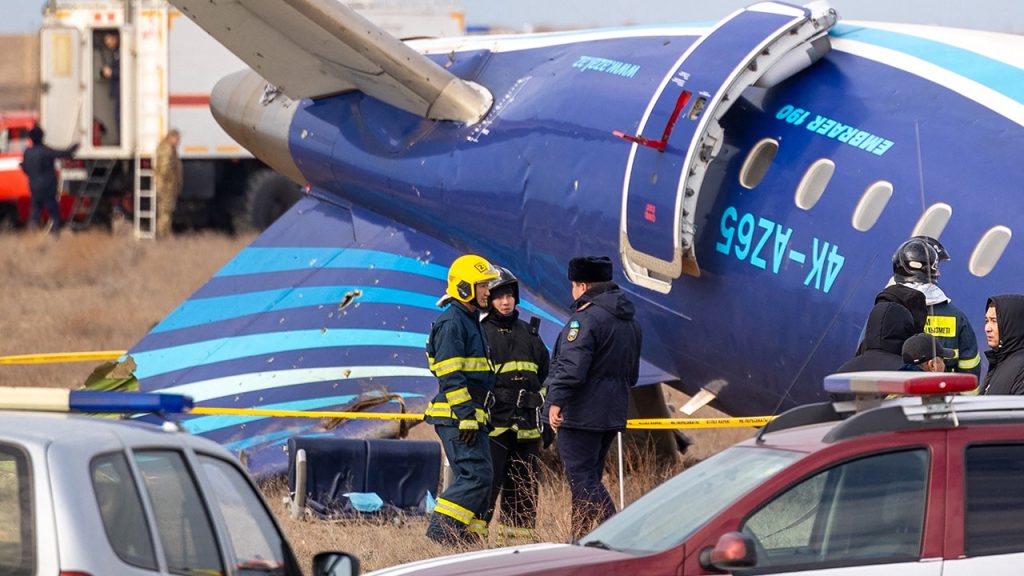The tragic downing of an Azerbaijan Airlines Embraer 190 passenger jet on Christmas Day, resulting in the loss of at least 38 lives, has sparked a diplomatic row between Azerbaijan and Russia, two nations traditionally considered close allies. Azerbaijani President Ilham Aliyev has publicly accused Russia of orchestrating an “absurd” cover-up, alleging that Russian air defenses were responsible for the incident. Aliyev’s accusations stem from what he perceives as Russia’s evasive and contradictory explanations in the immediate aftermath of the crash. While Russian President Vladimir Putin offered an apology for the “tragic incident,” the Kremlin has stopped short of formally acknowledging that its air defense systems were involved in the downing of the civilian aircraft. This perceived lack of transparency and accountability has fueled Aliyev’s frustration and fueled suspicions of a deliberate attempt to conceal the truth.
Aliyev’s pointed criticism of Russia, a nation with which Azerbaijan maintains strong political and economic ties, underscores the gravity of the incident and its potential to strain bilateral relations. In a televised address, Aliyev expressed his dismay at the “absurd versions” offered by Russia in the initial days following the crash, highlighting what he characterized as “clear attempts to cover up the matter.” This public rebuke, unusual given the normally cordial relations between the two countries, signals the depth of Azerbaijan’s dissatisfaction with Russia’s handling of the situation. The incident puts Aliyev in a delicate position, balancing the need to maintain a stable relationship with a powerful neighbor while simultaneously demanding transparency and accountability for the loss of his citizens.
The Kremlin’s official statement attributed the incident to Russian air defenses engaging with Ukrainian attack drones in the same vicinity. However, the statement crucially omitted any direct admission of responsibility for the downing of the passenger plane. This ambiguity has been interpreted by Azerbaijani authorities, and indeed by international observers, as an attempt to obfuscate the true cause of the crash. The absence of a clear and unequivocal acknowledgement of responsibility from the Russian side has only served to amplify suspicions and deepen the sense of mistrust surrounding the incident. This lack of transparency risks undermining the credibility of the Russian narrative and further straining relations between the two nations.
Accounts from survivors and crew members corroborate the theory that the Azerbaijani aircraft was struck by an external force. Passengers reported hearing a loud bang or explosion prior to the crash, followed by a noticeable change in the aircraft’s behavior. One survivor described the plane as feeling “drunk” and behaving erratically after the initial bang, suggesting significant damage had been sustained. Another survivor recounted hearing two explosions in the sky before the plane ultimately crashed. These firsthand testimonies lend credence to the assertion that an external factor, such as a missile strike, was responsible for bringing down the aircraft. These accounts, coupled with the Azerbaijani government’s accusations, put increasing pressure on Russia to provide a more complete and transparent explanation of the events leading to the tragedy.
The incident has also drawn attention to the complexities of operating in contested airspace, particularly in regions experiencing ongoing conflicts. The proximity of the crash site to the ongoing conflict in Ukraine raises questions about the safety protocols and procedures in place to mitigate the risk of civilian aircraft being caught in the crossfire. The incident highlights the need for enhanced communication and coordination between military forces and civilian air traffic control to prevent similar tragedies in the future. The international community must address the challenges posed by operating civilian aircraft in or near conflict zones to ensure the safety and security of passengers and crew.
Despite the public accusations and diplomatic tension, President Aliyev and President Putin held a phone conversation in the wake of the incident. The content of their discussion remains undisclosed, leaving the exact nature of their exchange open to speculation. Whether the conversation served to de-escalate tensions or further exacerbate the disagreement remains unknown. However, the fact that the two leaders engaged in direct communication suggests a desire to manage the crisis and prevent further deterioration of the bilateral relationship. The outcome of this incident and its long-term impact on the relationship between Azerbaijan and Russia will depend on the willingness of both sides to engage in open dialogue, establish the truth surrounding the downing of the aircraft, and take appropriate steps to prevent similar incidents in the future. The international community will continue to closely monitor the situation, urging both parties to prioritize transparency and accountability in their pursuit of the truth.

